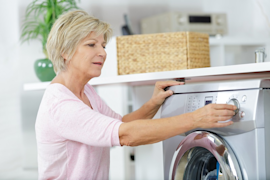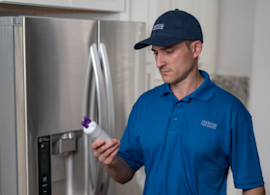Kenmore 110 model VMW top-load washer error codes

These error code explanations can help you diagnose a problem with your Kenmore top-load VMW washer with a model number that starts with 110. For repair how-to help, visit the PartsDirect repair help section, which includes repair help for washing machines, other major appliances, lawn and garden equipment, garage door openers, vacuum cleaners and more. Search for your model number to find a complete list of replacement parts for your washer.
On models without a digital display, the lid lock flashes to indicate that a fault occurred when the washer encounters a problem. Enter the diagnostic test mode to determine the error code that caused the problem. Watch this video to see how to enter the diagnostic test mode and retrieve and read the error codes.
Indicates the control recorded one of the error codes shown below
Enter the diagnostic test mode to read the error code as shown in the above video link.
Excessive suds
Use only HE (High Efficiency) detergent. Reduce the quantity of detergent to prevent excessive suds.
High water temperature in the rinse cycle
Make sure that fill hoses are properly connected. Check the resistance of the thermistor (temperature sensor). It should measure around 50K ohms (50,000 ohms) at 77 degrees. If the thermistor is defective, replace it.
Unbalanced load
Re-distribute the load inside the spin basket. If that doesn't help, then check the suspension rods and springs. If a suspension rod and spring is broken or damaged, replace all of the suspension rods and springs (the replacement part is a kit that has all 4 rods/springs).
Main electronic control board failure
Unplug the washer. Check the wiring connections on the main electronic control board in the console. If the wiring connections are okay, then the main electronic control board will usually need to be replaced.
Motor control error on main electronic control board failure
Unplug the washer. Check the wiring connections on the main electronic control board and the drive motor. If the wiring connections are okay, then the drive motor windings will need to be checked for resistance. If the drive motor is bad, replace it. If the drive motor is okay, the main electronic control board will usually need to be replaced.
Stuck key
This code is for models with a digital display. One or more keys on the user interface were actuated for 15 seconds or longer. If a key is stuck and cannot be freed up then the user interface control will need to be replaced.
Mismatch of main electronic control board and user lnterface control
This code is for models with a digital display. It typically occurs when an incompatible control component (Main Electronic Control board or User Interface control) is replaced in the console. Check the replacement part numbers and reorder the correct part.
Water level pressure sensor fault
Unplug the washer. Check the air hose connection between the bottom of the tub and the water level pressure switch on the main electronic control board in the console. If no problems are found, then the main electronic control board (which includes the water level pressure switch) will usually need to be replaced.
Inlet water temperature fault
Unplug the washer. Open the console and check the resistance through the thermistor circuit (black wires). It should measure around 50K ohms (50,000 ohms) at room temperature. If the thermistor is defective, replace it (the thermistor is a component in the inlet valve assembly wiring harness).
Lid switch fault
This code is displayed if Start is pressed with the lid open. If the lid switch on the lid lock/switch assembly isn't detecting the condition of the washer lid properly, then the lid lock/switch assembly will need to be replaced.
Lid lock fault
Unplug the washer. Check the lid lock/switch assembly for debris or an item that is interfering with the lock strike being engaged by the lid lock mechanism. If no interference is apparent, then the lid lock/switch assembly will usually need to be replaced.
Lid unlock fault
Unplug the washer. Lift the top panel of the washer to access the lid lock/switch assembly. Try to manually unlock the washer lid without breaking the lid lock/switch assembly and the lock strike. If the components are damaged, replace them. If the lid lock/switch assembly won't lock and unlock properly, replace it.
Lid not opened between cycles
If the washer is started several times without the lid ever being opened, then this code appears. If the lid is actually being opened between cycles but the control doesn't detect it, then the door lock/switch assembly will typically need to be replaced.
Basket speed sensor fault
See if the spin basket rotates freely. If not, then examine and replace any defective drive components. If the basket spins properly, unplug the washer and check the wiring connections on the shifter assembly. That component has the optical tachometer. If the wiring connections are okay, then that shifter will usually need to be replaced.
Shifter assembly fault
The main electronic control board cannot determine the position of the drive system shifter. Unplug the washer and check the wiring harness connections on the main electronic control board and the shifter assembly. If the wiring connections are okay, then the shifter assembly will usually need to be replaced.
Motor fault
Unplug the washer and check the wiring connections on the drive motor. If the wiring connections are okay, then the drive motor will typically need to be replaced.
Motor is unable to reach target RPM
Rotate the spin basket to see if it spins freely. If not, then a garment could be stuck between the outer tub and the spin basket. A problem with drive components could also cause excess friction. Inspect the drive components and replace parts as needed.
Not filling or long fill time
Water isn't being detected as entering the washer. If the washer isn't filling, check the water supply faucets behind the washer to make sure that they are fully open. Check the fill hoses and inlet water valves. If the inlet water valve assembly is defective, replace it. If water is entering the machine but not being detected, then the main electronic control board (which includes the water level pressure switch) will usually need to be replaced.
Overflow condition
If the washer is overfilling, check the inlet water valves. If the valves are not shutting off water flow, then replace the inlet water valve assembly. If the washer isn't actually overflowing, then the main electronic control board (which includes the water level pressure switch) will typically need to be replaced.
Hot & cold fill hoses are reversed
Check the fill hoses. If they are connected properly then the inlet water thermistor (temperature sensor) will probably need to be replaced. That component is part of the Inlet Water Valve Wire Harness.
Long drain time
The washer isn't draining after the drain pump runs for 10 minutes. Check the washer drain and the drain hose for clogs or restrictions. If the drain path is clear, unplug the washer and check the drain pump. If the drain pump is defective, replace it.
No fill or long fill
Water isn't being detected as entering the washer. If the washer isn't filling, check the water supply faucets behind the washer to make sure that they are fully open. Check the fill hoses and inlet water valves. If the inlet water valve assembly is defective, replace it. If water is entering the machine but not being detected, then the main electronic control board (which includes the water level pressure switch) will usually need to be replaced.
Long drain time
The washer did not drain after the drain pump has been running for 10 minutes. Check the washer drain and the drain hose for clogs or restrictions. If the drain path is clear, unplug the washer and check the drain pump. If the drain pump is defective, replace it.
Most common symptoms to help you fix your washers
Choose a symptom to see related washer repairs.
Main causes: broken lid switch or lid lock, bad pressure switch, broken shifter assembly, faulty control system...
Main causes: lack of electrical power, wiring failure, bad power cord, electronic control board failure, bad user interf...
Main causes: leaky water inlet valve, faulty water-level pressure switch, bad electronic control board...
Main causes: water heater failure, bad water temperature switch, faulty control board, bad water valve, faulty water tem...
Main causes: no water supply, bad water valves, water-level pressure switch failure, control system failure, bad door lo...
Main causes: worn agitator dogs, bad clutch, broken motor coupler, shifter assembly failure, broken door lock, suspensio...
Main causes: unbalanced load, loose spanner nut, worn drive block, broken shock absorber or suspension spring, debris in...
Main causes: clogged drain hose, house drain clogged, bad drain pump, water-level pressure switch failure, bad control b...
Main causes: bad lid switch or door lock, bad timer or electronic control board, wiring failure, bad water inlet valve a...
Most common repair guides to help fix your washers
Effective articles & videos to help repair your washers
Use the advice and tips in these articles and videos to get the most out of your washer.

Find tips for using your washing machine efficiently to save energy and help reduce utility bills....

Learn about all the convenient features on our Sears PartsDirect website that make your parts purchases easier....

Get answers to frequently asked questions about Sears and Sears PartsDirect....